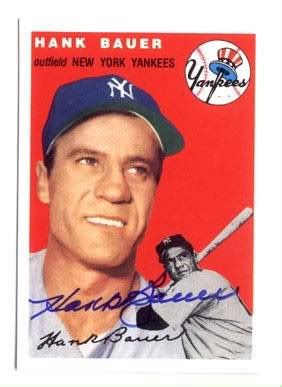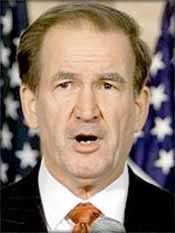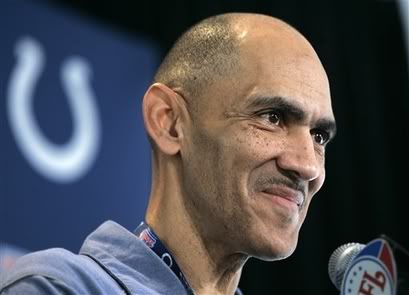It was a bit mention in the media which heaps praise on lowlifes like James Brown when they pass on, but Hank Bauer died the other day. I've pasted his obit and will include the link, maybe Don will want to put it on the front page. Just reading the story of this guys life makes me wonder WTF happened to this country.
Former Yankees OF Hank Bauer dies at 84
Hank Bauer
NEW YORK - Hank Bauer, the hard-nosed ex-Marine who returned to baseball after being wounded during World War II and went on to become a cornerstone of the New York Yankees dynasty of the 1950s, died Friday. He was 84. Bauer died of cancer in Shawnee Mission, Kan., said the Baltimore Orioles. Bauer managed the 1966 Orioles to their first World Series title.
A three-time All-Star outfielder, Bauer played on Yankees teams that won nine American League pennants and seven World Series in 10 years. He set the Series record with a 17-game hitting streak, a mark that still stands.
"Hank Bauer is an emblem of a generation that helped shape the landscape of our country," Yankees owner George Steinbrenner said in a statement. "He was a natural leader and a teammate in every sense of the word, and his contributions went well beyond the baseball field. His service to the Yankees, his country, and his family shows why I have been so privileged to call him a friend."
Surrounded by sluggers such as Mickey Mantle and Yogi Berra, Bauer was a major ingredient in the Yankees' success during his years in New York from 1948-59.
"I am truly heartbroken," Berra said in a statement issued by the Yankees. "Hank was a wonderful teammate and friend for so long. Nobody was more dedicated and proud to be a Yankee, he gave you everything he had."
Bauer played his last two seasons with the Kansas City Athletics, a team he managed in 1961-62. He also managed Baltimore from 1964-68 and the Athletics again in Oakland in 1969.
"He played on some of the greatest teams that ever played and brought the Orioles their first World Series title. That's saying something. He was a players' manager. He didn't overcomplicate things," Hall of Fame pitcher Jim Palmer said.
"He was my first manager in the major leagues. He gave me my first opportunity (in 1965) when he could have kept other people. I was lucky; he was a Jim Palmer fan. You can't get in the Hall of Fame without your first chance."
Bauer was voted The Associated Press AL Manager of the Year in 1964 and 1966, when his Orioles swept the Los Angeles Dodgers in the World Series. It was the only time he reached the Series as a manager, but he was a frequent participant in the postseason with the Yankees.
Bauer's World Series hitting streak stretched from 1956-58 when the Yankees dynasty was at its peak.
"Oh, it was a joy," he said in a 1998 interview. "I was there 11 years and we won nine pennants. And we could have very easily won 10 in a row, because in 1954 we won more games than we ever did. We won 103."
Cleveland won 111 that year, a rare interruption in the Yankees dynasty that stretched from 1949-64
Bauer enlisted in the Marines shortly after Pearl Harbor and saw action in a number of battles in the Pacific, including Okinawa and Guadalcanal, according to Hall of Fame archives. He earned two Bronze Stars and two Purple Hearts.
Bauer was wounded at Okinawa, hit in the left thigh by shrapnel in his 53rd day on the island.
"We went in with 64 and six of us came out," Bauer said.
After he was discharged, Bauer signed with the Yankees minor league affiliate at Kansas City and after two .300 seasons there, he moved to New York in 1948. A year later, Casey Stengel became the manager and Bauer moved into the lineup as the Yankees began their run.
Bauer batted .320 in his second full season and became a fixture in the Yankee outfield alongside Mantle. The two outfielders became close friends, and Bauer was a pallbearer at Mantle's funeral in 1995.
Equipped with a strong arm, Bauer was a dead pull fastball hitter, a disadvantage at Yankee Stadium with its spacious left field. He once said that if he hit a ball to right field, it was an accident.
Bauer batted .277 with 164 homers and 703 RBIs. It was in the World Series that he excelled, from a Series-ending catch at his knees against the New York Giants in 1951 to his final Series appearance in 1958, when he hit .323 with four homers and eight RBIs as the Yankees beat the Milwaukee Braves in seven games.
"Maybe I bore down a lot more in the Series," Bauer said. "I had my luck. I had my good days and bad ones. I played for the right organization."
In 1959, after the Yankees finished behind the Chicago White Sox, Bauer was part of a seven-player trade with Kansas City that delivered a young Roger Maris to New York. Two years later, Maris set a season record with 61 homers, a mark that stood until 1998.
Bauer kept his Marine Corps crewcut through his baseball career and beyond. After he retired, he returned home to the Kansas City area, where he scouted for the Yankees and the Royals. Later, he was a regular at Yankee annual Old-Timers' Days, an opportunity to reunite with friends from those championship seasons.
In the last week, two players whose careers intertwined with Bauer's days died. Steve Barber, who pitched for Bauer in Baltimore, died Sunday; Lew Burdette, who faced the Yankees in the 1957 and 1958 World Series, died Tuesday.
Former Yankees OF Hank Bauer dies at 84
Hank Bauer
NEW YORK - Hank Bauer, the hard-nosed ex-Marine who returned to baseball after being wounded during World War II and went on to become a cornerstone of the New York Yankees dynasty of the 1950s, died Friday. He was 84. Bauer died of cancer in Shawnee Mission, Kan., said the Baltimore Orioles. Bauer managed the 1966 Orioles to their first World Series title.
A three-time All-Star outfielder, Bauer played on Yankees teams that won nine American League pennants and seven World Series in 10 years. He set the Series record with a 17-game hitting streak, a mark that still stands.
"Hank Bauer is an emblem of a generation that helped shape the landscape of our country," Yankees owner George Steinbrenner said in a statement. "He was a natural leader and a teammate in every sense of the word, and his contributions went well beyond the baseball field. His service to the Yankees, his country, and his family shows why I have been so privileged to call him a friend."
Surrounded by sluggers such as Mickey Mantle and Yogi Berra, Bauer was a major ingredient in the Yankees' success during his years in New York from 1948-59.
"I am truly heartbroken," Berra said in a statement issued by the Yankees. "Hank was a wonderful teammate and friend for so long. Nobody was more dedicated and proud to be a Yankee, he gave you everything he had."
Bauer played his last two seasons with the Kansas City Athletics, a team he managed in 1961-62. He also managed Baltimore from 1964-68 and the Athletics again in Oakland in 1969.
"He played on some of the greatest teams that ever played and brought the Orioles their first World Series title. That's saying something. He was a players' manager. He didn't overcomplicate things," Hall of Fame pitcher Jim Palmer said.
"He was my first manager in the major leagues. He gave me my first opportunity (in 1965) when he could have kept other people. I was lucky; he was a Jim Palmer fan. You can't get in the Hall of Fame without your first chance."
Bauer was voted The Associated Press AL Manager of the Year in 1964 and 1966, when his Orioles swept the Los Angeles Dodgers in the World Series. It was the only time he reached the Series as a manager, but he was a frequent participant in the postseason with the Yankees.
Bauer's World Series hitting streak stretched from 1956-58 when the Yankees dynasty was at its peak.
"Oh, it was a joy," he said in a 1998 interview. "I was there 11 years and we won nine pennants. And we could have very easily won 10 in a row, because in 1954 we won more games than we ever did. We won 103."
Cleveland won 111 that year, a rare interruption in the Yankees dynasty that stretched from 1949-64
Bauer enlisted in the Marines shortly after Pearl Harbor and saw action in a number of battles in the Pacific, including Okinawa and Guadalcanal, according to Hall of Fame archives. He earned two Bronze Stars and two Purple Hearts.
Bauer was wounded at Okinawa, hit in the left thigh by shrapnel in his 53rd day on the island.
"We went in with 64 and six of us came out," Bauer said.
After he was discharged, Bauer signed with the Yankees minor league affiliate at Kansas City and after two .300 seasons there, he moved to New York in 1948. A year later, Casey Stengel became the manager and Bauer moved into the lineup as the Yankees began their run.
Bauer batted .320 in his second full season and became a fixture in the Yankee outfield alongside Mantle. The two outfielders became close friends, and Bauer was a pallbearer at Mantle's funeral in 1995.
Equipped with a strong arm, Bauer was a dead pull fastball hitter, a disadvantage at Yankee Stadium with its spacious left field. He once said that if he hit a ball to right field, it was an accident.
Bauer batted .277 with 164 homers and 703 RBIs. It was in the World Series that he excelled, from a Series-ending catch at his knees against the New York Giants in 1951 to his final Series appearance in 1958, when he hit .323 with four homers and eight RBIs as the Yankees beat the Milwaukee Braves in seven games.
"Maybe I bore down a lot more in the Series," Bauer said. "I had my luck. I had my good days and bad ones. I played for the right organization."
In 1959, after the Yankees finished behind the Chicago White Sox, Bauer was part of a seven-player trade with Kansas City that delivered a young Roger Maris to New York. Two years later, Maris set a season record with 61 homers, a mark that stood until 1998.
Bauer kept his Marine Corps crewcut through his baseball career and beyond. After he retired, he returned home to the Kansas City area, where he scouted for the Yankees and the Royals. Later, he was a regular at Yankee annual Old-Timers' Days, an opportunity to reunite with friends from those championship seasons.
In the last week, two players whose careers intertwined with Bauer's days died. Steve Barber, who pitched for Bauer in Baltimore, died Sunday; Lew Burdette, who faced the Yankees in the 1957 and 1958 World Series, died Tuesday.







